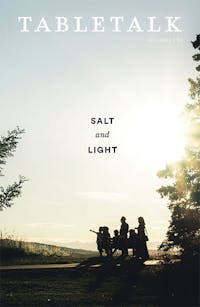
Request your free, three-month trial to Tabletalk magazine. You’ll receive the print issue monthly and gain immediate digital access to decades of archives. This trial is risk-free. No credit card required.
Try Tabletalk NowAlready receive Tabletalk magazine every month?
Verify your email address to gain unlimited access.
Every year, by the time July rolls around, I have already begun to anticipate the Christmas season. I begin to reflect on the joys of Christmastime even as I continue to experience all the joys of summertime. As I consider all the wonderful memories of Christmases past, my mind goes to all the delicious food, moments with my family, gatherings with friends, and beautiful decorations—especially the lights. One reason that Christians adorn their houses and trees with lights at Christmas is to celebrate Jesus Christ’s having come as the Light of the World.
There is something inexpressibly peaceful, hopeful, and glorious about lights glowing brilliantly in the darkness of night. The glow of even a single candle in the darkness conveys a sense of peace, and it reminds us of the contrast between light and darkness, a contrast emphasized throughout all of sacred Scripture. Ultimately, it is God who is light, and in Him there is no darkness at all (1 John 1:5). As God incarnate, the Word made flesh, Jesus Christ came into the world and declared: “I am the light of the world. Whoever follows me will not walk in darkness, but will have the light of life” (John 8:12). Jesus has told us that Christians, because we are united to Him by faith, reflect His light as the light of the world and the salt of the earth (Matt. 5:13–16).
Our being the light of the world points to the world’s being in darkness. Our being the salt of the earth points to the decaying world’s need for preservation and rescue from death. Therefore, God calls us to live our lives in contrast with the world, that we may be “blameless and innocent, children of God without blemish in the midst of a crooked and twisted generation, among whom [we] shine as lights in the world” (Phil. 2:15). God does not tell us that we should strive to be salt and light; He tells us that we are salt and light. That is to say, by virtue of being in Christ, reflecting His light, and God’s light shining through us by the Holy Spirit, our very identity is salt and light.
God calls us out of darkness and into His marvelous light, and then He commands us to go live as individuals, as families, and as the church in the midst of the darkness. We are not to shut ourselves off from the world, but we are to be ambassadors of Christ wherever we go—in the world but not of the world—shining the light of the gospel, demonstrating our love for one another, and doing good works so that people will glorify our Father in heaven and worship God coram Deo, before His face forever (John 13:35; 15:19; see Matt. 6:1; 2 Cor. 5:20).
